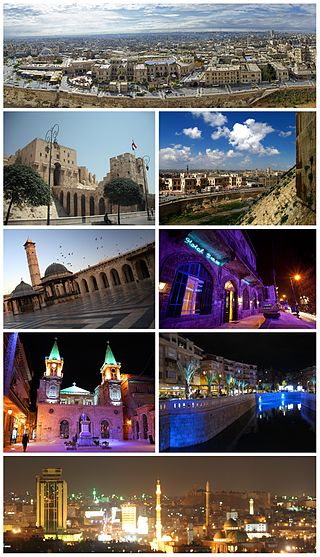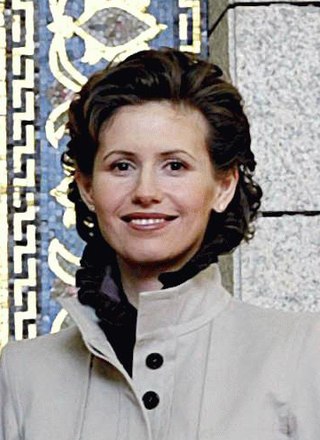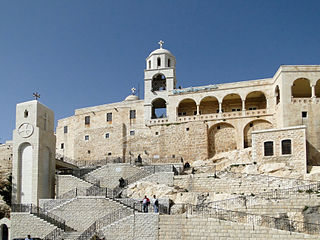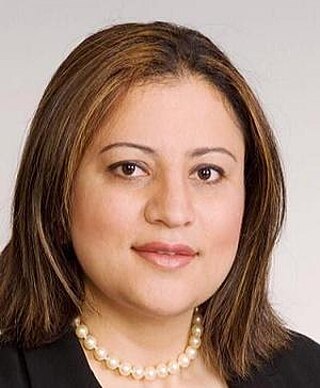Related Research Articles

Aleppo is a city in Syria, which serves as the capital of the Aleppo Governorate, the most populous governorate of Syria. With an estimated population of 2,098,000 residents as of 2021, it was Syria's largest city until its population was surpassed by Damascus, the largest in Syria's northern governorates and also one of the largest cities in the Levant region.

Bashar al-Assad is a Syrian politician who is the current and 19th president of Syria since 17 July 2000. In addition, he is the commander-in-chief of the Syrian Armed Forces and the secretary-general of the Central Command of the Arab Socialist Ba'ath Party, which nominally espouses a neo-Ba'athist ideology. His father and predecessor was General Hafiz al-Assad, whose presidency in 1971–2000 marked the transfiguration of Syria from a republican state into a de facto dynastic dictatorship, tightly controlled by an Alawite-dominated elite composed of the armed forces and the Mukhabarat, who are loyal to the al-Assad family.

Dennis William Siahou Sciama, was an English physicist who, through his own work and that of his students, played a major role in developing British physics after the Second World War. He was the PhD supervisor to many famous physicists and astrophysicists, including John D. Barrow, David Deutsch, George F. R. Ellis, Stephen Hawking, Adrian Melott and Martin Rees, among others; he is considered one of the fathers of modern cosmology.

Wafic Rida Saïd is a Syrian-Saudi-Canadian arms dealer, financier, and philanthropist, who has resided for many years in Monaco.

Syrian Jews are Jews who lived in the region of the modern state of Syria, and their descendants born outside Syria. Syrian Jews derive their origin from two groups: from the Jews who inhabited the region of today's Syria from ancient times, and sometimes classified as Mizrahi Jews ; and from the Sephardi Jews who fled to Syria after the Alhambra Decree forced the expulsion of the Jews from Spain in 1492.

Asma Fawaz al-Assad is the First Lady of Syria. Born and raised in London to Syrian parents, she is married to the 19th and current President of Syria, Bashar al-Assad.

Christians in Syria made up about 10% of the pre-war Syrian population. The country's largest Christian denomination is the Greek Orthodox Church of Antioch, closely followed by the Maronite Church and the Assyrian Church of the East; the cities of Damascus and Aleppo are believed to have the largest number of Christians in Syria. There is a small minority of Protestants in the country.

Syria, officially the Syrian Arab Republic, is a country in West Asia located in the Eastern Mediterranean and the Levant. It is bounded by the Mediterranean Sea to the west, Turkey to the north, Iraq to the east and southeast, Jordan to the south, and Israel and Lebanon to the southwest. Cyprus lies to the west across the Mediterranean Sea. It is a unitary republic that consists of 14 governorates (subdivisions). A country of fertile plains, high mountains, and deserts, Syria is home to diverse ethnic and religious groups, including the majority Arabs, Kurds, Turkmens, Assyrians, Circassians, Armenians, Albanians, Greeks, and Chechens. Religious groups include Muslims, Christians, Alawites, Druze, and Yazidis. The capital and largest city is Damascus, followed by Aleppo, Homs, Latakia, Hama, Deirezor, and Raqqa. Arabs are the largest ethnic group, and Sunni Muslims are the largest religious group. Syria is now the only country that is governed by Ba'athists, who advocate Arab socialism and Arab nationalism.

Syrian Americans are Americans of Syrian descent or background. The first significant wave of Syrian immigrants to arrive in the United States began in the 1880s. Many of the earliest Syrian Americans settled in New York City, Boston, and Detroit. Immigration from Syria to the United States suffered a long hiatus after the United States Congress passed the Immigration Act of 1924, which restricted immigration. More than 40 years later, the Immigration Act of 1965, abolished the quotas and immigration from Syria to the United States saw a surge. An estimated 64,600 Syrians immigrated to the United States between 1961 and 2000.

British Arabs are British citizens of Arab descent. They share a common Arab ethnicity, culture, language and identity from different Arab countries. Arabs also come from non-Arab countries as ethnic minorities.
Professor Kefah Mokbel FRCS is currently the chair of breast cancer surgery and the multidisciplinary breast cancer program at the London Breast Institute of the Princess Grace Hospital part of HCA Healthcare, Professor (Honorary) of Breast Cancer Surgery at Brunel University London, an honorary consultant breast surgeon at St George's Hospital. Kefah Mokbel is the founder and current president of Breast Cancer Hope; a UK-based charity "dedicated to improving the quantity and quality of life in women diagnosed with breast cancer". He was appointed as a substantive consultant breast surgeon at St George's Hospital NHS trust in February 2001. He was named in Tatler magazine's Best Doctors Guide as one of the featured "Top Breast Surgeons" in 2006, 2007 and 2013. In November 2010 he was named in the Times magazine's list of Britain's Top Doctors.
The Aleppo Artillery School massacre was a sectarian massacre of Syrian Army cadets on 16 June 1979. It was carried out by a handful of members of the Fighting Vanguard led by Adnan Uqlah, without the permission of the Fighting Vanguard's leader, Hisham Jumbaz. The Muslim Brotherhood in Syria was not responsible for the attack and condemned it after the fact, but the attack was used as a pretext for a large scale crackdown against it.

The Battle of Aleppo was a major military confrontation in Aleppo, the largest city in Syria, between the Syrian opposition against the Syrian government, supported by Hezbollah, Shia militias and Russia, and against the Kurdish-majority People's Protection Units (YPG). The battle began on 19 July 2012 and was part of the ongoing Syrian Civil War. A stalemate that had been in place for four years finally ended in July 2016, when Syrian government troops closed the rebels' last supply line into Aleppo with the support of Russian airstrikes. In response, rebel forces launched unsuccessful counteroffensives in September and October that failed to break the siege; in November, government forces embarked on a decisive campaign that resulted in the recapture of all of Aleppo by December 2016. The Syrian government victory was widely seen as a turning point in Syria's civil war.
Maskanah, also spelled Meskene, is a town in northern Syria, administratively part of the Manbij District of the Aleppo Governorate. The town is located 100 kilometres (62 mi) southeast of Aleppo on the Lake Assad part of the Euphrates. Nearby localities include Dayr Hafir, Humaymah Kabirah and Tell Ayoub to the northwest and al-Thawrah to the southeast. According to the Syria Central Bureau of Statistics (CBS), Maskanah had a population of 15,477 in the 2004 census. The Syrian government took control of Maskanah on 3 June 2017.

Presidential elections were held in Syria on 3 June 2014. There is a scholarly consensus that the elections were not democratic. The result was a landslide victory for Bashar al-Assad, who received over 90% of the valid votes. He was sworn in for a third seven-year term on 16 July in the presidential palace in Damascus.

The history of Syria covers events which occurred on the territory of the present Syrian Arab Republic and events which occurred in the region of Syria. Throughout ancient times the territory of present Syrian Arab Republic was occupied and ruled by several empires, including the Sumerians, Mitanni, Assyrians, Babylonians, Egyptians, Hittites, Canaanites, Phoenicians, Arameans, Amorites, Persians, Greeks and Romans. Syria is considered to have emerged as an independent country for the first time on 24 October 1945, upon the signing of the United Nations Charter by the Syrian government, effectively ending France's mandate by the League of Nations to "render administrative advice and assistance to the population" of Syria, which came in effect in April 1946.
During the Syrian Civil War, Russian and Syrian government forces have conducted a campaign that has focused on the destruction of hospitals and medical facilities within areas not under the control of the Syrian government. Russian and Syrian officials have repeatedly denied deliberately targeting medical facilities.

Dima Moussa is a Syrian lawyer, feminist and politician; she is a member of the Syrian political opposition and has served as vice president of the National Coalition for Syrian Revolutionary and Opposition Forces from May 2018 to July 2020 and started serving as vice president again in September 2023.
M. Moussa Ayoub (c.1873–1955) was a Syrian-born British artist known for his portraits. He was an active painter in London and Paris between 1903 until 1938.
References
- ↑ "2011 Census: Country of birth (expanded), regions in England and Wales". Office for National Statistics. 26 March 2013. Retrieved 7 January 2017.
- ↑ "Country of birth (detailed)" (PDF). National Records of Scotland . Retrieved 7 January 2017.
- ↑ "Country of Birth – Full Detail: QS206NI". Northern Ireland Statistics and Research Agency . Retrieved 7 January 2017.
- ↑ "ONS estimates for 2019".
- ↑ "Ayoub, Moussa | Benezit Dictionary of Artists". www.oxfordartonline.com. 2011. doi:10.1093/benz/9780199773787.article.B00009249. ISBN 978-0-19-977378-7 . Retrieved 2020-03-16.
- ↑ "PhysicsWorld Archive » Volume 13 » Obituary: Dennis Sciama 1926–1999". Physicsworldarchive.iop.org. Retrieved 2012-02-28.
- ↑ "PROCEEDINGS OF THE AMERICAN PHILOSOPHICAL SOCIETY VOL. 145, NO. 3, SEPTEMBER 2001" (PDF). Archived from the original (PDF) on 21 February 2012. Retrieved 28 February 2012.
- ↑ Bar, Shmuel (2006). "Bashar's Syria: The Regime and its Strategic Worldview" (PDF). Comparative Strategy. 25 (5): 353–445. doi:10.1080/01495930601105412. ISSN 0149-5933. S2CID 154739379. Archived (PDF) from the original on 26 November 2013.
- ↑ "President Assad's wife banned from travelling to Europe... but not Britain". The Mirror. 23 March 2012. Retrieved 17 July 2015.